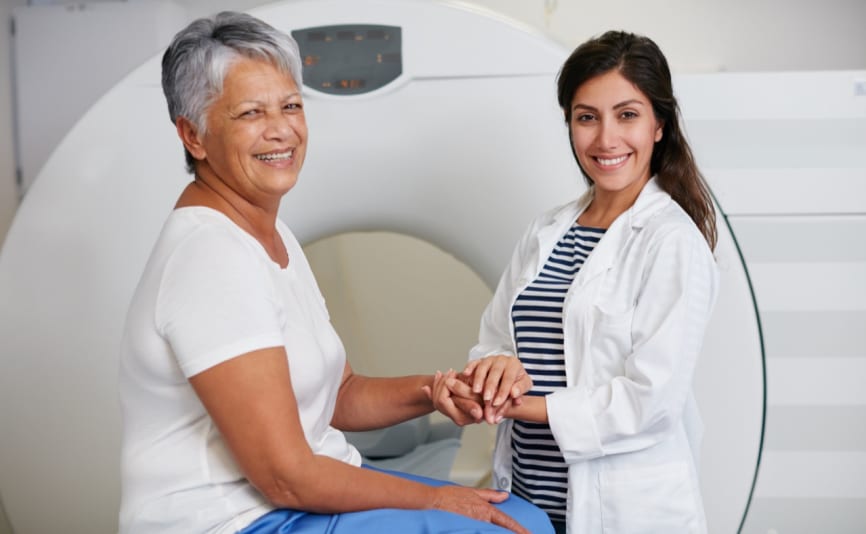Mammograms are a breast imaging screening tool, used for the early detection of breast cancer. They use a special type of X-ray machine that compresses each breast between two plates, to generate clear images that can help detect breast cancer.
You might have heard from a friend or family member that mammograms hurt, but this varies hugely between individuals. Modern mammogram machines are designed to reduce the discomfort felt during breast compression, and most women find their mammogram appointment is not as uncomfortable as they feared it would be.
It's really important to book your mammogram screening, and not avoid scheduling them due to worries about whether you will experience pain. Mammograms are carried out by experienced technologists who are there to support you, listen to you, and try and make the procedure as straightforward as possible.
However, there are some things you can do to reduce pain during a mammogram. This guide will equip you with everything you need to know to reduce discomfort, whether you've had multiple mammograms or if it's your first mammogram or second mammogram.
What can affect how painful a mammogram is?
Breast size
Those with smaller breasts may find mammograms hurt more than those who have larger breasts. This is because the mammogram machine compresses and spreads the breast tissue for clearer imaging, but if there is less tissue to be compressed it can be more uncomfortable. However, there are single-use padding options and different plate sizes to accommodate a range of breast sizes.
Those with breast implants may also find the procedure more uncomfortable, and the technique used to scan augmented breasts may differ slightly to ensure the natural breast tissue is not completely obscured by the implants. Let your radiographer know if you have breast implants.
Menstrual cycle
Breast tenderness is common when you are premenstrual (during the week before your period) or during your period, due to hormonal changes. This might make a mammogram more painful. To reduce discomfort, we recommend scheduling your mammogram to take place between one to two weeks after your period.
Dense or fibrocystic breasts
If you have denser breast tissue, you may find your breasts feel tender anyway, and a mammogram can increase breast sensitivity. If you have dense breasts, you should consider taking pain relief such as paracetamol or ibuprofen before and after your mammogram to alleviate discomfort.
Low pain tolerance
If you find yourself naturally prone to feeling pain more than others, you may just have a lower pain tolerance. This can, in turn, increase your level of anxiety about having the scan, which could cause higher levels of discomfort. Experiencing pain at any level is natural and can be managed - it's really important that you still schedule a mammogram in spite of it. A mammogram is an important screening that could have life-saving benefits, and it only lasts a few minutes. The same can be said for if you had a previous mammogram that was uncomfortable - it's still important not to put off your breast screening.
How can I reduce my pain level during my mammogram?
Time it right
Scheduling your mammogram breast exam to take place one to two weeks after your period is a simple way to reduce the level of pain you will experience. Hormonal swings can affect breast tenderness so it is important to keep this in mind when scheduling your screening.
Relax and reduce anxiety
If you feel anxious, it can affect how painful your mammogram is, according to Behavioural Science. It's true that most women don't enjoy their mammograms, and many do experience discomfort, but the benefits to their health outweigh the discomfort. Being prepared for your mammogram by scheduling it at the right time in your menstrual cycle, relaxing before the scan by using breathing exercises, and telling your healthcare provider about your concerns can help you feel more comfortable going into the scan and, in turn, reduce pain and discomfort.
Tell your mammographer
Mammographers are experienced technologists, but also healthcare providers who are trained to support patients. It's best to let them know if you feel worried or concerned, or if you experience pain, so that they can help make adjustments and put your mind at ease.
Reduce salty foods and caffeine
Some doctors advise against eating salty foods and consuming large amounts of caffeine in the two weeks leading up to your mammogram procedure. This is because excess salt intake can cause bloating and water retention and that along with caffeine may make the breasts feel more tender.
Take pain medication before your scan
Simple over-the-counter pain relief, such as ibuprofen or paracetamol taken 30 minutes before your scan, can reduce pain and alleviate discomfort. You can continue taking this according to the packet instructions after your scan if you find the pain continues.
Conclusion
Regardless of your pain tolerance, many women feel nervous about having a mammogram due to worries about whether it will be painful. The truth is, it is usually not painful, although some discomfort is normal.
Either way, your mammogram results can give you peace of mind about your breast health, while also flagging any early signs of cancer or other diseases. This can open the door to additional testing if any additional images are needed.
That's why it's important to schedule a mammogram appointment at the right time in your cycle, ensure you're as relaxed as possible, and lean on the support of your mammographer during your scan. This will help you get the results you need with as little discomfort as possible.
Sources used:
https://www.healthimages.com/10-tips-to-minimize-pain-during-mammograms/
https://www.cancer.org/cancer/types/breast-cancer/screening-tests-and-early-detection/mammograms/mammograms-for-women-with-breast-implants.html
https://www.check4cancer.com/advice-and-awareness/blog/1709-do-mammograms-hurt
https://www.nibib.nih.gov/science-education/science-topics/mammography
https://www.webmd.com/women/fibrocystic-mammograms






